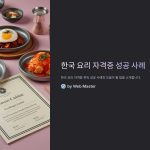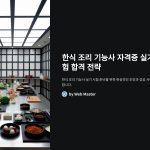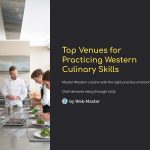 As the popularity of Korean cuisine continues to rise globally, so does the interest in acquiring professional certification. The Korean Cuisine Practical Cooking License is no longer limited to industry professionals—many enthusiasts, career changers, and even foreigners are pursuing it to enhance their culinary skills or start new food ventures. Recently, updates to the exam format and increased emphasis on plating and hygiene have made it more challenging. This post dives deep into the firsthand experiences of individuals who successfully passed the exam, detailing their study methods, practical tips, and emotional journeys. Whether you’re about to take the test or are simply curious about what’s involved, these real stories offer valuable insight into what it takes to succeed.
As the popularity of Korean cuisine continues to rise globally, so does the interest in acquiring professional certification. The Korean Cuisine Practical Cooking License is no longer limited to industry professionals—many enthusiasts, career changers, and even foreigners are pursuing it to enhance their culinary skills or start new food ventures. Recently, updates to the exam format and increased emphasis on plating and hygiene have made it more challenging. This post dives deep into the firsthand experiences of individuals who successfully passed the exam, detailing their study methods, practical tips, and emotional journeys. Whether you’re about to take the test or are simply curious about what’s involved, these real stories offer valuable insight into what it takes to succeed.

A Chef Mom’s Comeback After a 10-Year Hiatus
For Mrs. Kim, a 42-year-old stay-at-home mom with a former background in hotel cuisine, passing the Korean Cuisine Cooking License was not just a goal—it was a dream of reclaiming her professional identity. After a decade away from commercial kitchens, her biggest hurdle was regaining speed and precision. She devoted three months to daily practice, focusing intensely on knife skills and mise en place. Using mock test kits at home and watching YouTube tutorials during her kids’ nap times became part of her daily routine. On exam day, her calm demeanor and familiarity with the tasks led to success. Her advice: “Simulate test conditions and record your practice to spot inefficiencies.”

From Engineer to Culinary Artist: A Career Transition Tale
Lee Minsoo, 33, was an IT engineer who decided to pursue a lifelong passion—cooking. Switching careers wasn’t easy, especially with zero kitchen experience. He started from scratch by enrolling in a night cooking class, practicing recipes like Yukgaejang and Japchae repeatedly. His turning point came when he joined an online study group that shared practical tips and video feedback. They helped him correct common mistakes and master time management. His testimony highlights how collaboration and feedback were essential in his journey. His key advice: “Record everything and get peer reviews. You’ll accelerate your improvement tenfold.”

International Student Success: Mastering the Exam in a Foreign Language
Jasmine, a culinary student from the Philippines, faced an additional barrier—language. Despite her Korean conversational skills, technical culinary terms were a challenge. She overcame this by creating bilingual flashcards, translating every single term and instruction. Practicing with Korean peers helped her get used to local cooking styles. She also followed Korean food bloggers religiously to get plating ideas and hygiene pointers. When exam day arrived, her meticulous preparation paid off. “Don’t just memorize—understand the logic behind each dish,” she emphasizes.

Tackling Test Anxiety: How One Candidate Used Visualization Techniques
An often-overlooked challenge is the mental strain of the exam. Seo Yuna, 27, struggled with performance anxiety. Despite being technically proficient, nerves sabotaged her first attempt. Determined to try again, she incorporated visualization into her prep—she’d mentally rehearse the entire test process every night. She also adopted breathing exercises and short meditation sessions before each practice. By her second attempt, she was not only more skilled but far calmer. Her story is a reminder that mental readiness is just as crucial as physical skill.

High School Graduate’s Strategy for Passing Without a Cooking School
Not everyone can afford culinary school, and Choi Jinhyuk, an 18-year-old high school graduate, proved that dedication can fill the gap. He followed online resources, joined a Discord group of exam candidates, and practiced in his small kitchen. Using a whiteboard, he tracked his cooking time and common mistakes. He even borrowed a food thermometer and sanitation tools to simulate professional setups. His budget-friendly approach was tough but effective. “Consistency beats fancy equipment,” he proudly states.

Final Thoughts: Build a System That Works for You
While each journey to passing the Korean Cuisine Practical Exam is unique, all success stories share common themes: structured practice, feedback loops, and emotional resilience. The most effective candidates didn’t just memorize—they understood. They didn’t just practice—they optimized. No matter your background or starting point, building a personalized prep system and staying consistent is the ultimate key to passing. Reflect on what works for your schedule, temperament, and learning style, and design your strategy accordingly. These stories prove that with the right mindset and tools, anyone can achieve certification.
*Capturing unauthorized images is prohibited*





